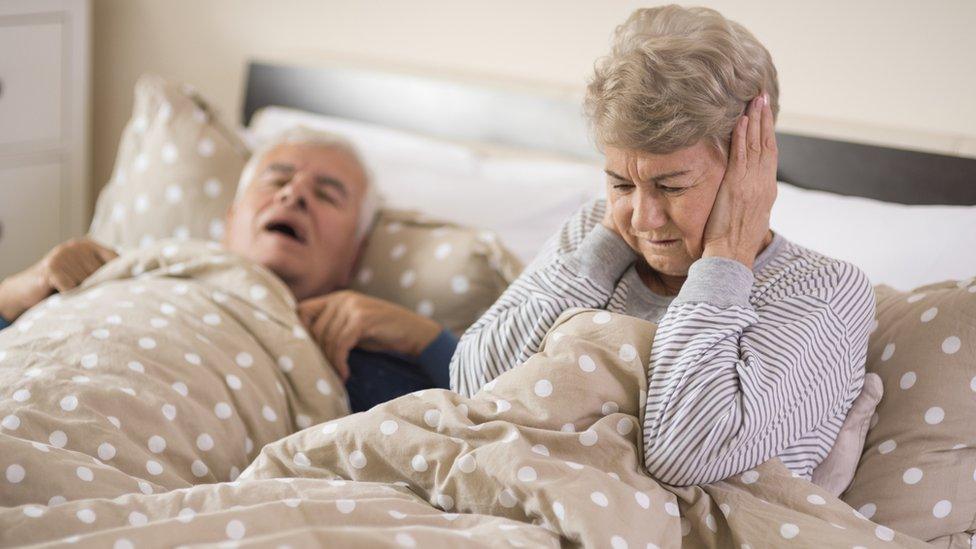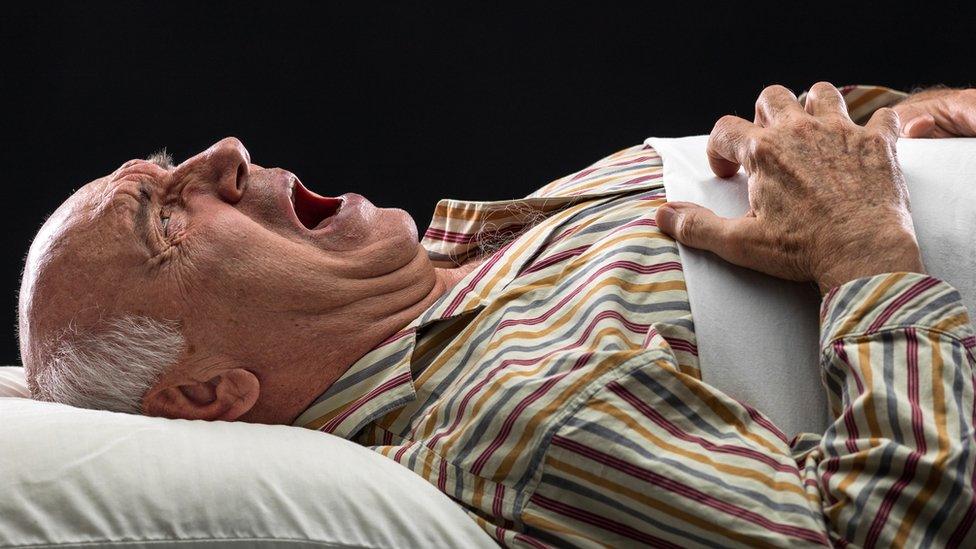'My husband attacked me in his sleep'
- Published

REM sleep behaviour disorder results in people acting out their dreams
When Liz's husband, John, attacked her in his sleep and drew blood, she finally realised she could no longer share a bed with him.
"He grabbed me on my arm", she says, "and it scared me so much when the nails went in, I was out of bed before I knew it, screaming my head off."
John, a gentle, mild-mannered man, is in his 80s and has been married to Liz for decades - but this physical violence during his sleep had been getting progressively worse.
"Five or six times he would kick me with such ferocity it would be like if you were walking behind a horse or a donkey and they lashed out and kicked you.
"And that was the freaky thing", she continues, "because it was almost like the day person was completely different to the night person."
John is one of my patients at the Sleep Disorders Centre at Guy's Hospital in London.
According to Liz, he's been doing odd things in his sleep for some time.
'Unbelievable force'
"Before the actual physical violence, there would be this very weird sound coming from John, like a crescendo and it was always scary, like what was he going to do once he'd got to the top? Was he going to lash out or what?"
John had been largely unaware of his violent actions while asleep, but he was aware that his dreams had been getting more frightening, sometimes violent.
"The kind of traditional nightmare of suddenly finding yourself in a large wood with a tiger," he explains.
"Or it could be other animals that frighten people like snakes - things that eat you and bite you. The moment that I leap out of bed is just before the jaws are clamped on me."
Other dreams that John describes involve arguments, occasionally fights, with people he knows.

The most violent dreams may be the ones that are acted out for those with the disorder
While we all occasionally have scary or violent dreams, the problem for John, and indeed Liz, is that John has started to act out his dreams.
"The arms and legs all go at the same time," says Liz. "It's almost unbelievable that he has that sort of force in him. If you asked him to do that in daily life, he wouldn't have a quarter of the strength."
John's actions have caused injury to both of them.
Once he kicked out and fell out of bed. On several other mornings Liz has been left with bruises and scratches.

Find out more
You can hear more on this story in Mysteries of Sleep, Episode 2, Dreaming - via the BBC iPlayer
Listen to the third episode of Mysteries of Sleep - on sleep deprivation - on BBC Radio 4 on Tuesday 19 December at 11:00 GMT and on Monday 25 December at 21:00 GMT
Search for #mysteriesofsleep on social media

Acting out dreams
Liz and John are describing a condition called REM sleep behaviour disorder (known as RBD). It happens during Rapid Eye Movement sleep, when we dream the most.
In normal REM sleep, our brains are incredibly active and almost look awake when we study brainwaves, but our bodies are almost entirely paralysed. There's a special switch in the brainstem that turns on the paralysis.
But people with RBD, like John, have a faulty switch, which results in them acting out their dreams, especially those that are violent or terrifying - with unpleasant results.
Rather unusually, RBD is one of the few medical conditions described in animals long before it was described in humans.
You might also like:
Only in the last few years have we understood the implications of REM sleep behaviour disorder: This acting out of dreams can be an early warning of neurological disorders like Parkinson's disease, sometimes up to a decade before the onset of more obvious problems, like difficulties walking and moving.
It's unclear why dreams in REM sleep behaviour disorder (RBD) become more violent or aggressive.
Perhaps the brain changes associated with RBD directly influence the nature of our dreams.
Maybe alterations in the brainstem result in thrashing or flinging movements that are integrated into the content of our dreams.
Perhaps only the most violent dreams are the ones that are acted out, wake people up and are remembered.
Separate beds
Fortunately for John, there is no evidence to suggest Parkinson's or any other brain disorder.
I've been treating his RBD with melatonin, a hormone produced by the brain as a signal to sleep. We don't know how it works for this condition, but there may be receptors for this hormone in the brainstem that account for its success. Liz thinks there has been an improvement.
"Since taking the medication, I'm daring to actually believe maybe it's doing something", she says. "Maybe he is sleeping a little bit deeper but not so deep he doesn't know what he's doing."
But John's violent acting out of his dreams hasn't stopped completely. And he is taking no chances.
"I obviously take it so seriously that until I can find a solution to this, we're going to have to continue sleeping in separate beds", he says.
The names in this article have been changed.
- Published11 December 2017

- Published12 May 2014
